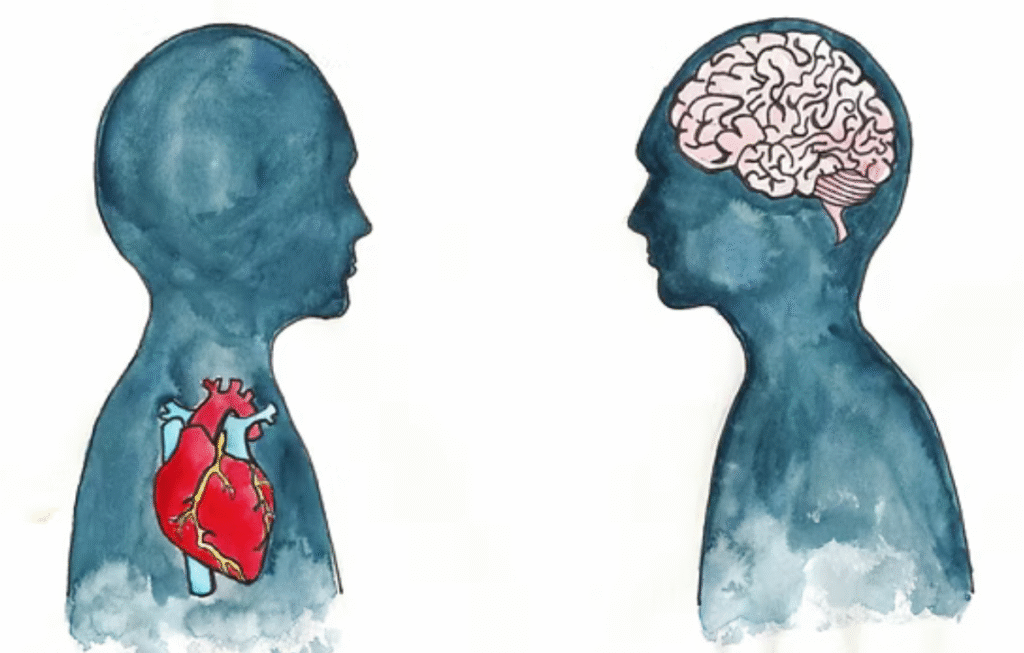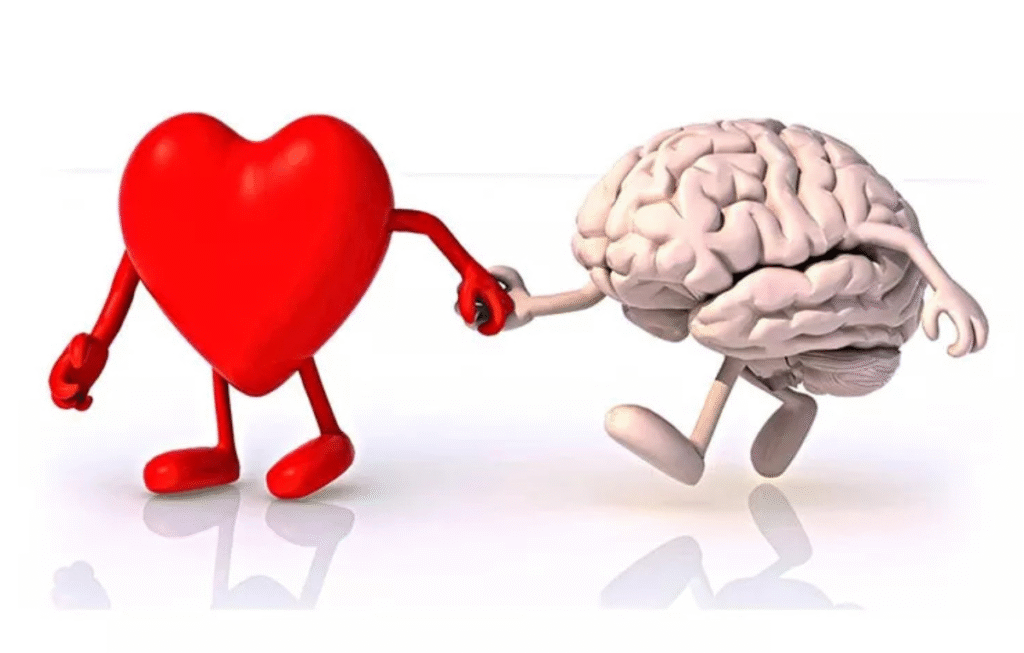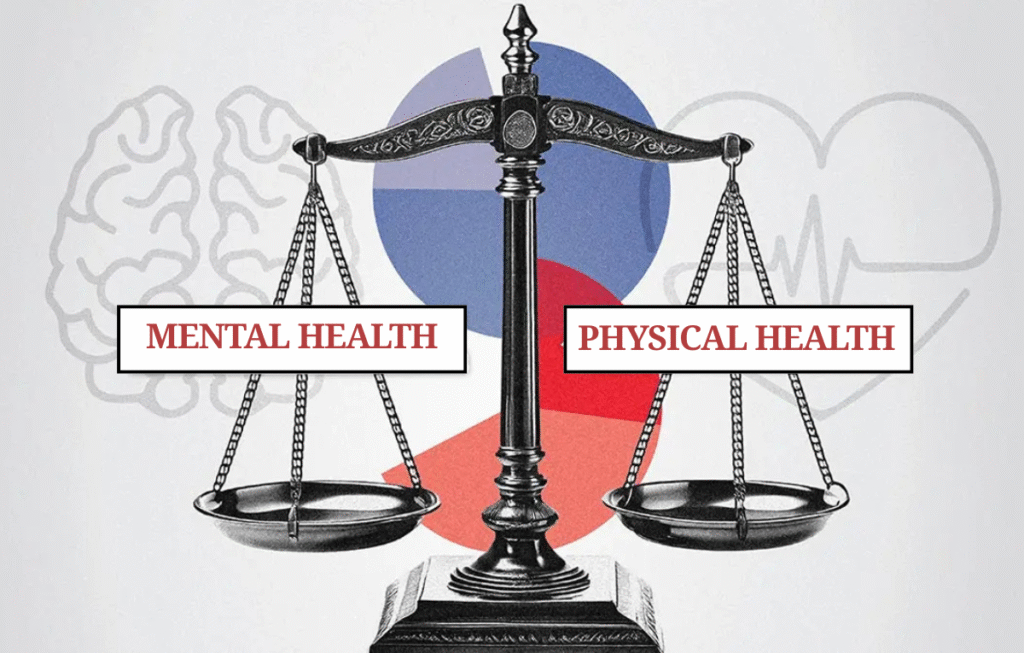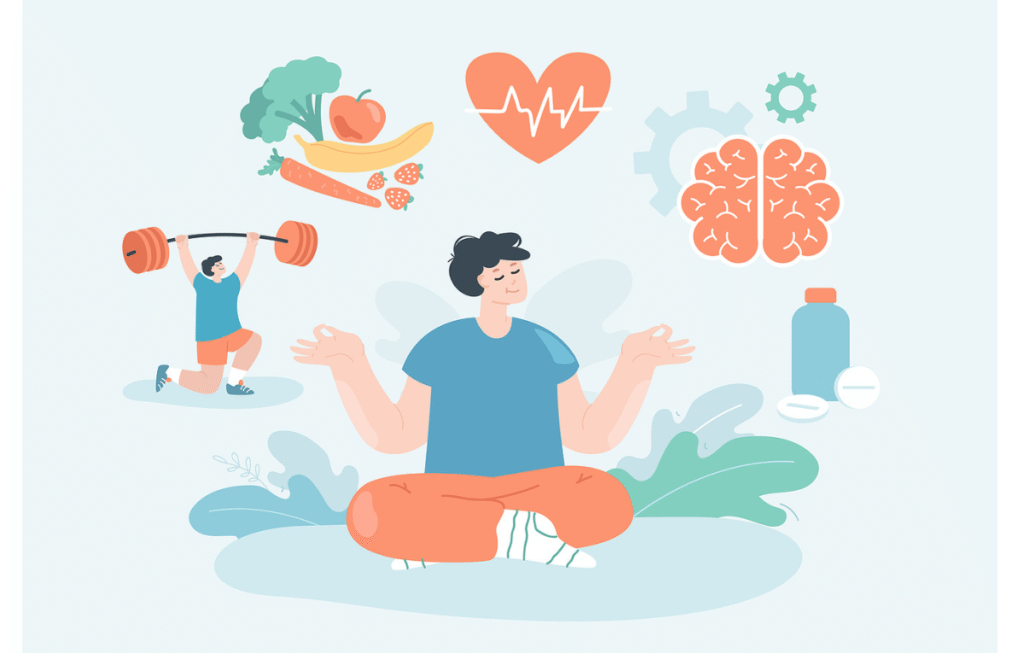Physical health and mental health are inseparable.
The majority of people split health into mental and physical health. However, the two cannot be evaluated separately. The mind and body are always in tandem. If your mental health takes a hit, it appears on your body, and if your body undergoes illness, it deeply affects your mental health.
The “mind-body connection” refers to this deep relationship. It is essential to acknowledge this connection because neglecting mental health while only tending to the physical body would mean being far from fully healthy.
In this article, we will learn in detail how mental and physical health interact, the underlying science, which diseases are influenced by this relationship, and what simple steps you can take to maintain both simultaneously.
The science behind the relationship between mind and body

Our body and mind are not separate entities. They are deeply interconnected through nerves, hormones, and many body systems.
1. The nervous system’s reaction
In moments of stress and anxiety, the brain immediately engages the sympathetic nervous system. This then shifts the body to “fight or flight” mode heart rate accelerates, blood pressure climbs, and the hormone cortisol is set loose.
If short-lived, “fight or flight” mode is fine, but over a long period it can take its toll on the body.
2. Hormonal changes
Your body constantly repeatedly makes hormones like cortisol, and adrenaline when you are under stress. Each of these hormones are intended to help protect you under acute challenge, and this is great.
However, the negative health effects from chronic and frequent exposure to these hormones affect your heart, blood sugar and sleep.
3. Effect on the immune system
Good mental health enhances the immune system. However, chronic stress or depression decreases the immune system making an individual more susceptible to illness and infection.
4. Inflammation and Associated Diseases
Scientific research shows that an upset mind leads to an increase in bodily inflammation. This inflammation can give rise to many serious diseases such as diabetes, arthritis, and heart disease.
To put it simply, what takes place in the mind impacts the mind is not confined. It has ramifications on the entire body.
Effect of mental health on physical health
Mental problems often appear as concrete symptoms in the body. Let’s look at some major examples:
1. Stress and body
Prolonged stress is the biggest enemy. It can:
- Raise the risk of heart diseases and blood pressure.
- Cause headaches, muscle tension and problems with your stomach.
- Weaken the immune system making you subject to frequent infections.
Example : If a person is under office stress every day, then this person may face more frequent headaches and blood pressure issues, especially after months of such stress.
2. Depression and the body
Depression is not just sadness. It affects the body too:
- Persistent tiredness and lack of energy
- Appetite and weight changes
- Increased risk of diabetes and heart disease
3. Anxiety and physical effects
People who worry constantly are always in a state of alert. The result can be:
- Sleep problems (insomnia)
- Fast heartbeat and breathlessness
- Stomach issues like vomiting, diarrhea or IBS
4. Effects on lifestyle
Mental problems can also lead to taking part in bad habits indirect ways i.e. smoking, drinking or eating junk food or not going to the gym. Eventually this leads to obesity, diabetes and other health problems.
Physical health affects mental health.
The relationship is not one-sided. Just as mental conditions affect the body, physical problems also affect the mind.

1. Chronic illnesses and depression:
Going through illness like Diabetes, Cancer, and Heart conditions creates tremendous stress. Patients may experience anxiety and depression.
2. Hormonal changes:
Conditions like thyroid dysfunction or PCOS may affect mood and cause moodiness, irritability, and depression.
3. Lack of sleep and mental illness:
Poor sleep increases the chances of irritability, difficulty concentrating, and depression.
4. Physical disability or injury:
Living in pain or having issues with mobility may create feelings of loneliness and decrease confidence affecting mental health.
Real examples
- Heart Disease: Those that experience Stress and Depression are more likely to have a heart attack. People with heart disease also have higher rates of depression.
- Diabetes: Stress hormones can affect blood sugar levels. Diabetic patients also have a higher incidence of anxiety and depression.
- Obesity: Overeating is common when eating is a response to stress or sadness. This can lead to being overweight or obese. When someone is obese, there is a greater chance of their depression worsening.
- Chronic Pain: Depression increases pain awareness. Pain awareness (mental and physical pain) leads to a fear response.
Practical ways to improve mental and physical health
The two are connected, so care must be taken simultaneously.

1. Get regular exercise.
Exercise is beneficial for the mind and body. Exercise encourages the release of endorphin’s (the hormones of happiness) to boost your mood and decrease stress.
2. Eat a balanced diet.
Food is fuel for the mind and body. Fresh fruit, green vegetables, cereals and legumes, and foods high in Omega-3 will nourish your body and mood.
3. Get good sleep.
It is important to sleep for 7-8 hours daily. Try to be off your mobile phone or TV before sleeping and have a peaceful environment.
4. Manage your Stress.
Doing things like yoga, meditation, deep breathing, or other mindful activities can help to relieve our stress levels.
5. Keep Your Social Connections.
Spending time with family and friends increases our mood and is an anti-loneliness act that benefits our mental health.
6. Stop Unhealthy Behaviors.
You may not think it makes a difference, but replacing your bad habits with healthy habits, and avoiding smoking, drinking and eating unhealthy foods does makes a difference.
7. Seek help, if needed.
I urge you to go to your doctor, counselor, or psychologist if your mental ailments are any greater without hesitation.
Benefits of caring for your mental and physical health

When you take care of your mental and physical health:
- Your immunity will be stronger, and recover from illness and disease will be quicker.
- Mood will be good, and energy will remain.
- Memory and attention will be better.
- Risk of chronic diseases will be reduced.
- Strength to face the challenges of life will increase.
Conclusion
You might be surprised how much mentally healthy people are similar to physically healthy people. If someone is physically healthy, it probably means they have a healthy mind; similarly, the reverse is true.
When you just focus on one side of either your body or mind, you will never really get past healthy. You must care for both sides. Caring for both sides will allow you to have a balanced, energetic, and happy life.
FAQs:-
How are mental and physical health connected?
Mental health directly affects physical well-being, while physical health conditions can also impact mental state. Both work together for overall wellness.
What’s the best way to maintain mind-body balance?
A mix of regular exercise, healthy eating, quality sleep, stress management, and social connection helps maintain balance.
How does physical health affect mental health?
Chronic illnesses, poor diet, or lack of exercise can increase stress, low mood, and risk of mental health problems.
